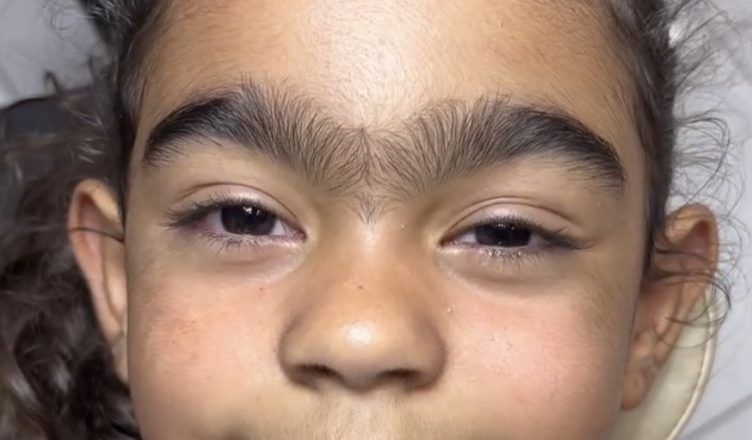She was just a kid, but her eyebrows had already become a topic of conversation.
One brow was noticeably fuller, bushier, and sat just a little differently than the other. It gave her face a lopsided expressiveness—like she was always mid-question or on the verge of figuring something out. Adults called it “character,” while classmates found it endlessly entertaining.
“One’s always asking questions, and the other just gave up!” a boy once joked during art class, earning a chorus of giggles and a red flush across her cheeks. It wasn’t cruel. Not really. But it stuck.
Her name was Mari. She was nine, soft-spoken, and carried a sketchbook everywhere. Her drawings were full of sharp-eyed owls, creatures with elaborate wings, and girls who looked suspiciously like her but with wild, perfect eyebrows that mirrored each other like poetry.
Every mirror glance came with a familiar ritual: tilt the head, raise the left, flatten the right, try to make them match. But they never did. Her mom told her she was beautiful just as she was, and her dad said that people with unusual features were the ones everyone remembered. Still, that didn’t make school easier.
So, one spring morning, her parents gently suggested something new.
Not a big deal. Not a transformation.
Just a little balance.
Mari didn’t say much, just nodded. She didn’t quite understand what a “brow appointment” meant, but she liked the word “balance.” It sounded like peace.
The studio smelled like eucalyptus and clean cotton. Soft music played, and the woman who greeted them—Yasmine—smiled with her whole face. She didn’t reach straight for Mari’s face like so many others had. Instead, she crouched beside her chair.
“Wanna tell me what you see when you look at your brows?”
Mari blinked. No one had asked her that before. After a long pause, she said, “One looks like it’s protecting the other.”
Yasmine’s smile didn’t falter. “That’s a powerful way to look at it.”
The shaping took less than fifteen minutes. No plucking frenzy, no radical change. Just a few quiet moves, like tidying up a beloved garden without trimming away the wildflowers.
When Mari looked in the mirror afterward, her eyebrows still weren’t twins. But now, they looked like they were talking to each other. Balanced, not identical. A team.
At school the next week, no one said much. A couple of friends paused, tilted their heads, then went back to chattering about recess. The silence was its own kind of magic.
That night, Mari drew again. This time, she sketched a girl with uneven eyebrows—not hiding them, not trying to make them perfect. Just letting them be.
And on the corner of the page, she wrote one word in tiny script: Power
